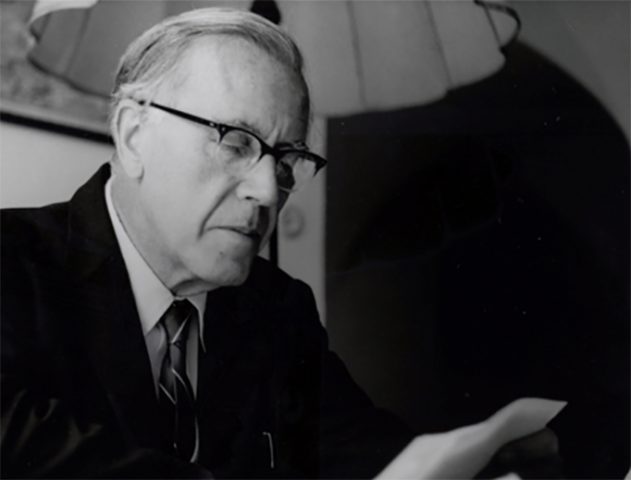PHOTO: Dietrich von Hildebrand
Simplicity, sincerity and humility — and especially reverence — are essential to true purity.
The following essay was excerpted from Dietrich von Hildebrand’s In Defense of Purity, which first appeared in 1927 and was released in a new English edition on Oct. 17, 2017. The new edition features a new foreword by Alice von Hildebrand, who writes, “This is what he set out to do in In Defense of Purity: to explore purity as a positive reality and only in light of its beauty to describe its contrary.” The excerpt appears here with permission of the Hildebrand Project.
The pure man perceives the mystery of sex.
 He perceives its depth, its seriousness, its intimacy — whether because, temperamentally awake to these qualities, he apprehends intuitively the character of sex, or because, temperamentally unaware of them, he knows it rather from the outside.
He perceives its depth, its seriousness, its intimacy — whether because, temperamentally awake to these qualities, he apprehends intuitively the character of sex, or because, temperamentally unaware of them, he knows it rather from the outside.
He understands implicitly the sublime purpose and fundamental significance of sex, and perceives the fearful profanation which every abuse of sex represents, the deadly poison, defiling the soul and separating it from God, which sexual pleasure generates when treated as its own end.
He is marked by a profound shrinking from any contact with sex as soon as it is thus isolated and rendered poisonous. He possesses a deep reverence for the mystery of which he is here in the presence.
Sex as such in no aspect seems to him contemptible or base. Bearing no repugnance to the fact of sex, free from all prudish and hysterical disgust, whether of sex as such or of the act of marriage, he remains at a respectful distance from it so long as he is not called by the disposition of God to enter its domain.
Reverence is a Key to Purity
Reverence is a fundamental component of purity. The pure man always lives in an attitude of reverence for God and His creation, and therefore reveres sex, its profundity, and its sublime and divinely ordained meaning. Indeed, and we have now reached the factor which is decisive both for purity and for the character of sex, the pure man understands that sex belongs in a special manner to God, and that he may only make such use of it as is explicitly sanctioned by Him. Only with God’s express permission may he eat of the fruit of this tree. Nothing reveals more plainly the presence of a mystery than this need of a special sanction from God to enter the sexual domain. In contrast to the innocuous sphere of eating and drinking, or that of intellectual activity, the domain of sex belongs in a unique fashion to God.
To be sure, in his employment of all earthly goods man must regard himself as God’s steward, not as his own master. Here, however, an entirely new factor comes into play. This sphere, in virtue of its depth and mystery, is reserved in an altogether special fashion to God, and man, even within the permitted bounds, is not simply free, as in other spheres, to do whatever seems good to him.
Moreover, this mystery which attaches to sex, even as an objective reality, results from its quality as revealed in experience, even if we leave out of account the fact that it is the mysterious seat of propagation, though the latter sets the mystery of sex in a particularly vivid light, and stands in a profound intrinsic connection with it. Man must feel for sex an awe which no other sphere demands — an awe which permits his access only if God in a special fashion should give him leave, as He gives it in the sacramentof matrimony.
For the truly pure man the bond with wedded love and the intention of a common life to last till death are not sufficient; he requires further the specific consciousness of God’s express sanction, the knowledge that it is only by divine permission that he lifts the veil from this mystery, an attitude which can be paralleled elsewhere in the religious sphere. And even when he may lift the veil, he will never abandon himself without restraint to the pleasure of sex.
To be sure he may — indeed, he should — surrender himself without reserve to the beloved, but not to the specific quality of sex. The latter always demands, even when it is entirely positive, a reverent awe; and demands it to be “formed” by being brought into explicit relation to God.…
True Modesty is Simple, Sincere and Humble
The pure man guards his secret, never lifts the veil unbidden. He is always modest. But his modesty has nothing that savors of self-importance, whether of conduct or feeling. He does not guard the secret by simply concealing it from others while he revels in it himself and in so doing feels himself somehow important. That is the attitude of the prude. With the pure you never breathe this oppressive atmosphere. Simple and open, he is distinguished by a limpid radiance of soul. He remains at a distance from his secret so long as God does not call upon him to unveil it. With spirit serene and bright and in an attitude of humility he leaves it in God’s hand.
We are here brought face to face with an absolutely essential element of purity. In a special sense the pure man walks with God. He never departs from the Divine Presence. He does not hide himself from God, like Adam after the Fall. He will never consent to anything incompatible in its quality with the light of holiness which shines upon us from the countenance of Jesus.
Within his soul an indefinable “something” always abides in unclouded light; his spirit is neither corroded by the intoxicating poison of sex as its own end, nor infected by the oppressive sultriness which distinguishes the zone of evil lust. His soul is steeped in a peculiar light, radiant and clear; there is in him no twilight or dusk; he is surrounded by no atmosphere heavy with poisonous perfume and in which it is impossible to breathe freely. No cloud darkens his spirit as it “shines” before God.
As we have already seen, the pure is distinguished by the rich plenty of his spiritual endowment. The specific beauty attaching to the unclouded luster of a soul which has come from God’s hand, has been redeemed by Christ, and is the likeness of God – the beauty, that is, of the spiritual person – shines out upon us from the pure. The pure man remains a vessel in which the light which flows forth from God can unfold without obscuration; his soul shines before God, because it reflects His glory.
Moreover, a peculiar peace has possession of his entire being; not inwardly alone, but outwardly to the world his soul reflects something of His peace who is called “our peace and our reconciliation.” But only the soul that is filled with love can be pure in this positive sense; the cold and proud spirit can never possess this unclouded light.
Purity is further characterized by a humble sincerity. The pure man feels himself a sinner capable, but for the help of God’s grace, of being submerged at any moment by the flesh. With the heathen poet he confesses, “Homo sum, humani nihil a me alienum puto” (I am human, and nothing human I consider foreign to me). He does not shrink from looking at the dangers which surround him full in the face. He never forgets that “the devil goeth about as a roaring lion, seeking whom he may devour.” He does not imagine himself made of other material than flesh and blood and inaccessible to the weakness of the flesh.
Remote from him, too, is the false modesty of the prude, who refuses to admit the existence of these dangers for himself or others. And his attitude continues the same even if he has never experienced sexual temptations. For simplicity, sincerity, and humility are almost as essential to true purity as is reverence.







